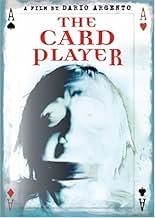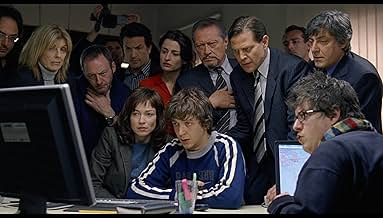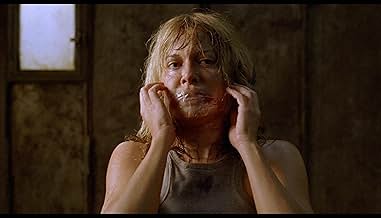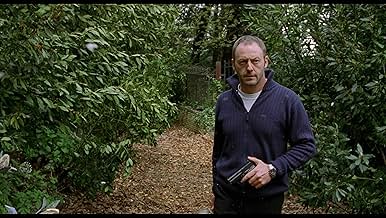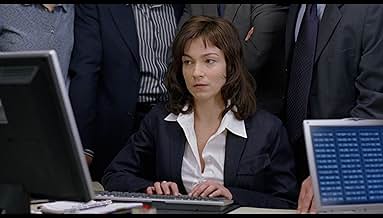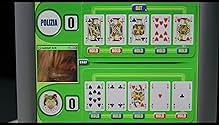CALIFICACIÓN DE IMDb
4.9/10
5.8 k
TU CALIFICACIÓN
Una policía romana y un agente de Interpol británico persiguen a un asesino serial que secuestra mujeres, las mata en webcam y juega con la policía.Una policía romana y un agente de Interpol británico persiguen a un asesino serial que secuestra mujeres, las mata en webcam y juega con la policía.Una policía romana y un agente de Interpol británico persiguen a un asesino serial que secuestra mujeres, las mata en webcam y juega con la policía.
- Dirección
- Guionistas
- Elenco
- Premios
- 1 nominación en total
Pier Maria Cecchini
- Flying Squad Chief
- (as Piermaria Cecchini)
Opiniones destacadas
Dario Argento's new thriller about a serial killer who forces the police to play video poker against him in order to save the lives of women he has kidnapped doesn't rank with the director's best work, but it is fast paced and entertaining if you aren't expecting too much.
After the disastrous Phanton of the Opera Argento made Sleepless, which was a self-conscious attempt to duplicate the success of his 1970's giallos, down to giving long defunct group Goblin credit for the soundtrack. Sleepless was certainly watchable, but it felt more like an Argento rip-off by an inferior director rather than the real thing, like the master had somehow turned into Antonio Bido or Luigi Cosi.
This time around Argento makes a movie that is less obviously grounded in his own previous success--The Card Player is far more generic than Sleepless, but since Argento isn't trying so hard to recapture past magic the film tends to work much better.
Unfortunately plotting and characterization have always been his achilles heel. Classic Argento films are about set-pieces and style, not plot. Stendhal Syndrome suffered because it turned into a character driven psychological thriller, which didn't play to his strengths as a filmmaker. The Card Player is largely plot-driven, lacking the stylistic flourishes and memorable set-pieces that defined his classic films and also offset his weaknesses as a writer. The Card Player generally feels like a made for TV crime thriller or even a pilot for a potential television show.
But while The Card Player isn't great or even mildly believable it is pretty fun on a cheesy B movie level, and the finale involving a handcuff key, a racing train and a lap-top manages to capture the delirious goofiness that came easily to the director back when he made Phenomena and Deep Red. It's not hard to imagine Argento giggling when he came up with his climactic scene and the sense of fun is infectious.
Most fans have probably accepted by now that Dario Argento isn't the filmmaker he was twenty years ago and that he will likely never make another classic thriller, but The Card Player is at least good enough not to disappoint, given the lowered expectations that now inevitably greet one of his movies. For me this was easily his best since Trauma. It also offers reason for optimism: Sleepless was a huge improvement over Phantom of the Opera and The Card Player is better than Sleepless, giving fans a reason to look forward to his next film.
After the disastrous Phanton of the Opera Argento made Sleepless, which was a self-conscious attempt to duplicate the success of his 1970's giallos, down to giving long defunct group Goblin credit for the soundtrack. Sleepless was certainly watchable, but it felt more like an Argento rip-off by an inferior director rather than the real thing, like the master had somehow turned into Antonio Bido or Luigi Cosi.
This time around Argento makes a movie that is less obviously grounded in his own previous success--The Card Player is far more generic than Sleepless, but since Argento isn't trying so hard to recapture past magic the film tends to work much better.
Unfortunately plotting and characterization have always been his achilles heel. Classic Argento films are about set-pieces and style, not plot. Stendhal Syndrome suffered because it turned into a character driven psychological thriller, which didn't play to his strengths as a filmmaker. The Card Player is largely plot-driven, lacking the stylistic flourishes and memorable set-pieces that defined his classic films and also offset his weaknesses as a writer. The Card Player generally feels like a made for TV crime thriller or even a pilot for a potential television show.
But while The Card Player isn't great or even mildly believable it is pretty fun on a cheesy B movie level, and the finale involving a handcuff key, a racing train and a lap-top manages to capture the delirious goofiness that came easily to the director back when he made Phenomena and Deep Red. It's not hard to imagine Argento giggling when he came up with his climactic scene and the sense of fun is infectious.
Most fans have probably accepted by now that Dario Argento isn't the filmmaker he was twenty years ago and that he will likely never make another classic thriller, but The Card Player is at least good enough not to disappoint, given the lowered expectations that now inevitably greet one of his movies. For me this was easily his best since Trauma. It also offers reason for optimism: Sleepless was a huge improvement over Phantom of the Opera and The Card Player is better than Sleepless, giving fans a reason to look forward to his next film.
The Card Player' directed and co-authored by leading Italian filmmaker, Dario Argento is quite different from what I expected, based on Argento'' reputation based on his best known film, the horror classic, 'Suspiria' of about 20 years ago. This movie is much less Wes Craven and much more Alfred Hitchcock, although I think Argento does not quite measure up to the Great Hitchcock in his use of subtlety and surprise, although there are a few good surprises in this film.
While this movie was made by a thoroughly Italian cast and crew, except for Irish actor, Liam Cunningham, almost all the original dialog as we hear it in the film was spoken in English as it was filmed. Mistaking this for a horror film was easy based on the cover art and some of the blurbs on the package. And, these hints are not entirely misleading, as there is a fair amount of intentional horror based on a fairly extended threat of death to a victim seemingly unable to free herself from the situation, unlike Hitchcock's secret threat, suddenly sprung on the unsuspecting victim as in 'Psycho'.
The mechanics and most business of the story are ultramodern. The victims are kidnapped, bound, and gagged (albeit a bit amateurishly), and the prep sends an e-mail to a female police detective that in order to free the Vic, the police will need to have someone play computer poker with the prep, freeing the Vic by winning two out of three hands. The first victim is a British tourist, bringing the Irish detective attached to the UK consulate in Rome into the case. And, this detective happens to be a forensics expert, so a lot of his early investigations are straight out of the 'CSI' casebook. Although, none are so modern that you couldn't see almost the identical business in a movie made 50 years ago, just as you see them in the murder / suicide investigation scene in Fellini's 'La Dolce Vita'.
Not only is the plot much more a thriller than a horror show, but the quality of the acting, directing, and camera work is high as well. Unfortunately, I feel the writing, in the implausibility of many plot turns, is just a bit too weak. While Argento may be one of the best known Italian filmmakers working today, his scripts fall far short of the great plot and dialog of Fellini and Bertolucci.
One of the very first weaknesses is in the way the police failed to play the contact with the prep. Given the chance to bring in an expert poker player to play the hands, that task falls wholly nilly to the female detective who is not only a poor poker player, but has a monkey on her back about gambling and poker, as her father committed suicide after a failure at cards. For the second kidnapping, the police happen upon a detective who knows something about poker, but who fails nonetheless. Only with the third victim do the police enlist the assistance of an expert computer poker player, who succeeds in effecting the release of the victim.
Explaining more implausibilities starts to give away some of the better parts of the plot, so I will stop there and note that this DVD has my very favorite feature, an audio commentary running the entire length of the film. The commentary is by the cinematic author, Alan Jones rather than by the director or his co-author or producer, but it's pretty good. Since, as the commentator notes, Argento does not film in any of the well-known tourist locations (except for a brief glimpse of the Pantheon and a scene in the Tiber), but in the 'real' bourgeois' Rome. So, commentator Jones gives us an orientation for where we are in Rome and on the events which help us understand the plot. He also points out the virtually total absence of blood in the film, which was a conscious decision by the director, since so many of his other films are so singularly bloody.
While this movie was made by a thoroughly Italian cast and crew, except for Irish actor, Liam Cunningham, almost all the original dialog as we hear it in the film was spoken in English as it was filmed. Mistaking this for a horror film was easy based on the cover art and some of the blurbs on the package. And, these hints are not entirely misleading, as there is a fair amount of intentional horror based on a fairly extended threat of death to a victim seemingly unable to free herself from the situation, unlike Hitchcock's secret threat, suddenly sprung on the unsuspecting victim as in 'Psycho'.
The mechanics and most business of the story are ultramodern. The victims are kidnapped, bound, and gagged (albeit a bit amateurishly), and the prep sends an e-mail to a female police detective that in order to free the Vic, the police will need to have someone play computer poker with the prep, freeing the Vic by winning two out of three hands. The first victim is a British tourist, bringing the Irish detective attached to the UK consulate in Rome into the case. And, this detective happens to be a forensics expert, so a lot of his early investigations are straight out of the 'CSI' casebook. Although, none are so modern that you couldn't see almost the identical business in a movie made 50 years ago, just as you see them in the murder / suicide investigation scene in Fellini's 'La Dolce Vita'.
Not only is the plot much more a thriller than a horror show, but the quality of the acting, directing, and camera work is high as well. Unfortunately, I feel the writing, in the implausibility of many plot turns, is just a bit too weak. While Argento may be one of the best known Italian filmmakers working today, his scripts fall far short of the great plot and dialog of Fellini and Bertolucci.
One of the very first weaknesses is in the way the police failed to play the contact with the prep. Given the chance to bring in an expert poker player to play the hands, that task falls wholly nilly to the female detective who is not only a poor poker player, but has a monkey on her back about gambling and poker, as her father committed suicide after a failure at cards. For the second kidnapping, the police happen upon a detective who knows something about poker, but who fails nonetheless. Only with the third victim do the police enlist the assistance of an expert computer poker player, who succeeds in effecting the release of the victim.
Explaining more implausibilities starts to give away some of the better parts of the plot, so I will stop there and note that this DVD has my very favorite feature, an audio commentary running the entire length of the film. The commentary is by the cinematic author, Alan Jones rather than by the director or his co-author or producer, but it's pretty good. Since, as the commentator notes, Argento does not film in any of the well-known tourist locations (except for a brief glimpse of the Pantheon and a scene in the Tiber), but in the 'real' bourgeois' Rome. So, commentator Jones gives us an orientation for where we are in Rome and on the events which help us understand the plot. He also points out the virtually total absence of blood in the film, which was a conscious decision by the director, since so many of his other films are so singularly bloody.
After getting almost unanimously negative reviews, I was dreading watching IL CARTAIO. It turns out that the film is not bad at all. No, it's not another SUSPIRIA, but nor is it a PHANTOM OF THE OPERA, thankfully. People keep going on about the absence of Argento's trademark style. Well, I want to know what style that would be? Suspiria's? Phenomena's? The Stendhal Syndrome's? I think you get my point. Argento doesn't have one single style -- he had many, and I think that Il Cartaio's style is different rather than absent. I personally liked the camerawork and the cold look of the film. The use of shadow is really good, and I think this has got to be the only film Argento has done that is obviously set in the winter. It gave everything an eery look.
It's a tightly constructed little thriller with a lot of very tense set-piece scenes. The lack of gore confused me a bit, but everyone seems to forget the impalement of a certain character. That, to me, was pretty gory although admittedly not flamboyant. In many ways it seems a lot like the antithesis of Non Ho Sonno, which was extremely over the top in terms of violence.
I think Tenebre was the last film Argento did that received almost unanimous critical acclaim on its initial release. All of his other triumphs since then have grown on people over the years. I don't think Il Cartaio will be any different.
It's a tightly constructed little thriller with a lot of very tense set-piece scenes. The lack of gore confused me a bit, but everyone seems to forget the impalement of a certain character. That, to me, was pretty gory although admittedly not flamboyant. In many ways it seems a lot like the antithesis of Non Ho Sonno, which was extremely over the top in terms of violence.
I think Tenebre was the last film Argento did that received almost unanimous critical acclaim on its initial release. All of his other triumphs since then have grown on people over the years. I don't think Il Cartaio will be any different.
I'm a big fan of Dario Argento's work; his early works are true works of perfection and have seen most of his stuff and mostly his work do strikes many of emotions such as thrills, tension and brilliant over the top death scenes. But after during the late 90's to present most of his stuff have been hit and miss, and this one from reading the reviews have been classed as a miss. But In my opinion I actually rather enjoyed this effort from him, sure it doesn't have almost none of his trademark technique's. But on its own it does stand as an okay murder mystery.
Firstly the plot is a very interesting and intriguing one, we get the old serial killer playing cat and mouse with the police routine, and in this case we get a killer setting up an online poker game with the police force, while using an innocent woman as bait and if they lose, she dies. This does make for a very interesting story line and it does keep the viewer interested in seeing what happens, and I did feel for these victims in that situation, but the fact that nothing is shown, doesn't leave a lasting impression, as nothing is shown afterwards and kind of makes the outcome disappointing.
Plus it lacks the stunning visuals that Argento's normally provides, instead the look and feel of the movie, looks very standard, and more towards the mainstream side of things. But the two leads are very decent, Stefania Rocca as Anna was a very strong leading character, she does keep you interested and has a good presence on screen even with the bad dialogue, and Liam Cunningham makes for another good character as her partner John and even their forcibly written romantic subplot, they makes it believable and they do share great chemistry together, along with the both of them fighting their demons does anchor the story along at a nice pace. Also Slivio Muccino was another good addition as the computer wiz kid, he was just brilliant. But the other side characters were just forgettable and were just poorly written.
But some of the other aspects of this movie doesn't really work, like the whodunit mystery in which this movie very much relies on, wasn't really inventive or shocking, and the final climax was just very predictable and just plodded along, and even the motive or lack of and honestly had a hard time remembering who he was at the end and just seemed lacking and lazy, but the overacting at the end was rather fun.
All in all "The Card Player" is an okay serial killer mystery flick, but for fans of Dario's visual style, you will be sorely disappointed, as this just doesn't take any risks at all and feels just rather safe and plodding.
Firstly the plot is a very interesting and intriguing one, we get the old serial killer playing cat and mouse with the police routine, and in this case we get a killer setting up an online poker game with the police force, while using an innocent woman as bait and if they lose, she dies. This does make for a very interesting story line and it does keep the viewer interested in seeing what happens, and I did feel for these victims in that situation, but the fact that nothing is shown, doesn't leave a lasting impression, as nothing is shown afterwards and kind of makes the outcome disappointing.
Plus it lacks the stunning visuals that Argento's normally provides, instead the look and feel of the movie, looks very standard, and more towards the mainstream side of things. But the two leads are very decent, Stefania Rocca as Anna was a very strong leading character, she does keep you interested and has a good presence on screen even with the bad dialogue, and Liam Cunningham makes for another good character as her partner John and even their forcibly written romantic subplot, they makes it believable and they do share great chemistry together, along with the both of them fighting their demons does anchor the story along at a nice pace. Also Slivio Muccino was another good addition as the computer wiz kid, he was just brilliant. But the other side characters were just forgettable and were just poorly written.
But some of the other aspects of this movie doesn't really work, like the whodunit mystery in which this movie very much relies on, wasn't really inventive or shocking, and the final climax was just very predictable and just plodded along, and even the motive or lack of and honestly had a hard time remembering who he was at the end and just seemed lacking and lazy, but the overacting at the end was rather fun.
All in all "The Card Player" is an okay serial killer mystery flick, but for fans of Dario's visual style, you will be sorely disappointed, as this just doesn't take any risks at all and feels just rather safe and plodding.
Of course it's not Dario's best, but it's not his worst. I give it a 5.5, leaning more on the 6 side.
Anna Mari (Taras Kostyuk) is a policewoman working with an Irish policeman (Liam Cunningham) and a young poker champ (Silvio Muccino) to catch a killer who kills his young female victims if the police loose a game of video poker.
This movie seems like an okay mix of "Silence of the Lambs", "Saw 2", and "CSI".
The music, like in all of Darios films, is great. The look of the dead bodies are also fantastic and spooky.
However, Phoebe Scholfield and Jay Benedict (both first time writers) did a horrible job of the dialogue. In fact, I didn't like most of the writing. It was confusing at times but as long as you don't think too deep into it, you can enjoy this as a neat little screaming-and-crying-girl flick with great special effects and so-so kills. They're so-so because most of them are offscreen and similar, but towards the end they get great and unique.
So you could easily enjoy this if you just want to pass the time, but don't expect another Argento classic.
Anna Mari (Taras Kostyuk) is a policewoman working with an Irish policeman (Liam Cunningham) and a young poker champ (Silvio Muccino) to catch a killer who kills his young female victims if the police loose a game of video poker.
This movie seems like an okay mix of "Silence of the Lambs", "Saw 2", and "CSI".
The music, like in all of Darios films, is great. The look of the dead bodies are also fantastic and spooky.
However, Phoebe Scholfield and Jay Benedict (both first time writers) did a horrible job of the dialogue. In fact, I didn't like most of the writing. It was confusing at times but as long as you don't think too deep into it, you can enjoy this as a neat little screaming-and-crying-girl flick with great special effects and so-so kills. They're so-so because most of them are offscreen and similar, but towards the end they get great and unique.
So you could easily enjoy this if you just want to pass the time, but don't expect another Argento classic.
¿Sabías que…?
- TriviaWhen Anna (Stefania Rocco) is attacked in her home, (suddenly) a pair of dismembered fingers are shown; this is left in / over from shots not included the film, first inferred when John (Liam Cunningham) inspects / lifts the first victim corpse's arm in the mortuary, and then to the water recovered victim, which in a short location 'making of' documentary, is shown as also had missing fingers.
- ErroresBoom mic visible at the top when English detective comes and insulting begins.
- Citas
John Brennan: THIS IS FUCKING BOLLOCKS!
- ConexionesReferenced in ¿Te gusta Hitchcock? (2005)
Selecciones populares
Inicia sesión para calificar y agrega a la lista de videos para obtener recomendaciones personalizadas
- How long is The Card Player?Con tecnología de Alexa
Detalles
Taquilla
- Presupuesto
- EUR 2,000,000 (estimado)
- Total a nivel mundial
- USD 3,368,452
- Tiempo de ejecución1 hora 43 minutos
- Color
- Mezcla de sonido
- Relación de aspecto
- 1.85 : 1
Contribuir a esta página
Sugiere una edición o agrega el contenido que falta

Principales brechas de datos
By what name was El amo del juego (2003) officially released in India in English?
Responda


